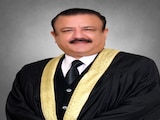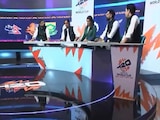In the waning light of a summer that once promised prosperity, Lalu Prasad Yadav finds himself in a twilight of his own making, echoing with the poignant shadows of history.
Much like the legends of fallen empires, the saga of the Yadav family encapsulates the tumult of dynastic politics - a realm where power, pride, and familial bonds intertwine in a precarious dance, often ending in disaster.
Today, as the spectre of family conflict looms over him, Lalu stands at the precipice of his own "Autumn of the Patriarch".
Dynasty politics is often a breeding ground for conflict
Dynasty politics, as Lalu well knows, can be both a pathway to greatness and a breeding ground for contention. It was he who first imposed Rabri Devi, his wife, as the Chief Minister when faced with mounting allegations of corruption during the infamous fodder scam, initiating a tradition that melded personal allegiance with public duty.
During the Rabri Devi era, Lalu Prasad's two brothers-in-law, Subhash and Sadhu Yadav, began meddling in the politics of the RJD. Lalu-Rabri Devi's nine children were much younger at the time. Decades later, the very foundation of Lalu Prasad's political lineage seems to be crumbling under the weight of its own contradictions.
Sister Rohini versus younger brother Tejashwi Yadav
The echoes of rebellion resonate within the hallowed halls of the Yadav's sprawling Circular Road residence in Patna, where familial ties that once seemed unbreakable are now fraying at the seams.
The recent exodus of Dr Rohini Acharya, his second daughter, followed by three of her sisters with their families (Rajlakshmi, Ragini and Chanda), speaks volumes about the turbulence within this political dynasty.
Fueled by a storm of accusations against her brother, Tejashwi Yadav, and his aides, Sanjay Yadav and Ramij Khan, her high-profile departure is not merely a family quarrel but a raucous indictment of the leadership that has led the RJD to its electoral nadir.
In May this year, Lalu Yadav expelled his elder son, Tej Pratap Yadav, from both the party and the family for a period of six years.
Tej Pratap, who formed a new political outfit, contested from Mahua in the recently concluded assembly elections and lost.
Two years ago, Lalu Prasad's elder daughter-in-law, Aishwarya Rai (divorced ex-wife of Tej Pratap Yadav), was literally thrown out of the house by the family over a dispute with the Yadav family.
Aishwariya is the daughter of Chandrika Rai, another politician of Bihar and a former minister in Lalu Prasad's cabinet and the granddaughter of the late Daroga Prasad Rai, who was Chief Minister of Bihar in 1970 for a period of 10 months.
Rohini, who had donated her kidney to Lalu, told the media, "I have family. I was asked to leave by Sanjay Yadav and Ramij, who are friends of Tejashwi Yadav."
She alleged she was hit by chappals (slippers), and abuses were hurled. Neither Tejashwi Yadav has commented on the matter, nor have his aides Sanjay Yadav and Ramij.
Brother Tej Pratap and Uncle Sadhu Yadav support Rohini
Tej Pratap has publicly come out in support of his sister Rohini, even threatening "Sudershan Chakra" against the Tejashwi-led team of Sanjay Yadav and Ramij.
Uncle Sadhu Yadav has also publicly supported Rohini.
Rohini, it may be recalled, had contested the Lok Sabha elections from Saran constituency in 2024 but lost narrowly against Rajiv Pratap Rudy of the BJP.
Today, only the eldest sister, Dr Misa Bharati (a Member of Parliament from Patliputra constituency) and Tejashwi are left with their parents in Patna.
Rohini, in her poignant farewell, recounted violent altercations, the casting aside of kinship for political expediency, and an overwhelming sense of betrayal. "I have no family," she lamented, denouncing the actions of those who once shared her blood. Her emotional outburst serves as a reflection of a family caught in the throes of its own intricacies, where love once flourished but now breeds resentment and alienation.
For a leader who once basked in glory, these accusations unearth the vulnerabilities that politics often conceals under layers of charisma and bravado.
The staggering electoral downfall of the RJD: from 75 seats in 2020 to 25 in 2025
The sheer magnitude of the RJD's downfall is staggering. From a commanding 75 seats in the 2020 assembly elections, the party has been reduced to a meagre 25 - its worst showing since 2010.
The Mahagathbandhan, a coalition that promised unity against the NDA, has splintered, its tally dwindling to a troubling 35 seats. As Lalu Prasad's allies falter and his party appears in serious trouble, the NDA emerges triumphantly, boasting 202 seats, a testament to the shifting tides of allegiance and the ephemeral nature of political power.
The conflicting narratives within this family saga resonate with insights from the annals of history, where battles of succession often lead to ruin. Lalu's first son, Tej Pratap Yadav, was ousted not only from the party but from the familial embrace that once honoured him as a prince in waiting. The expulsion of Aishwarya Rai, his estranged wife, shortly before his brother's betrayal, reveals the often brutal and public nature of family politics, where personal grievances spill into the political arena.
As the walls of the Yadav residence echo with whispers of discord, one cannot help but draw parallels to past dynasties that faced their own downfalls due to internal strife. Lalu, once a colossus of Bihar's political landscape, finds himself grappling with the legacy of his own creation - a clan where loyalty is held hostage to ambition, and family bonds are severed by the very ambitions that once bound them together.
Familial loyalty and trust have been replaced by suspicion and betrayal
In this intricate web of political intrigue, the grievous losses extend beyond mere numbers. They unravel the fabric of familial loyalty and trust, ushering in a new era marked by suspicion and betrayal. The consequences of such a steep fall are stark; what remains is a family attempting to navigate a landscape fraught with division and uncertainty.
Lalu Prasad faces the disintegration of his dynasty
As Lalu Prasad Yadav navigates the autumn of his political career, he is beset by the consequences of dynastic choices, faced with the disintegration of the very dynasty he sought to protect. The battle lines drawn within his family are not merely about political power; they represent a struggle for identity and relevance in an age where the winds of change blow fiercely.
The echoes of history serve as a reminder: dynastic politics may offer the promise of continuity, but it often leads to an inevitable reckoning - a clash not just with external adversaries, but within the very heart of the family itself.
The Yadav legacy stands at a crossroads, questioning whether it can rise again or if it will be consumed by the very forces it sought to master.















